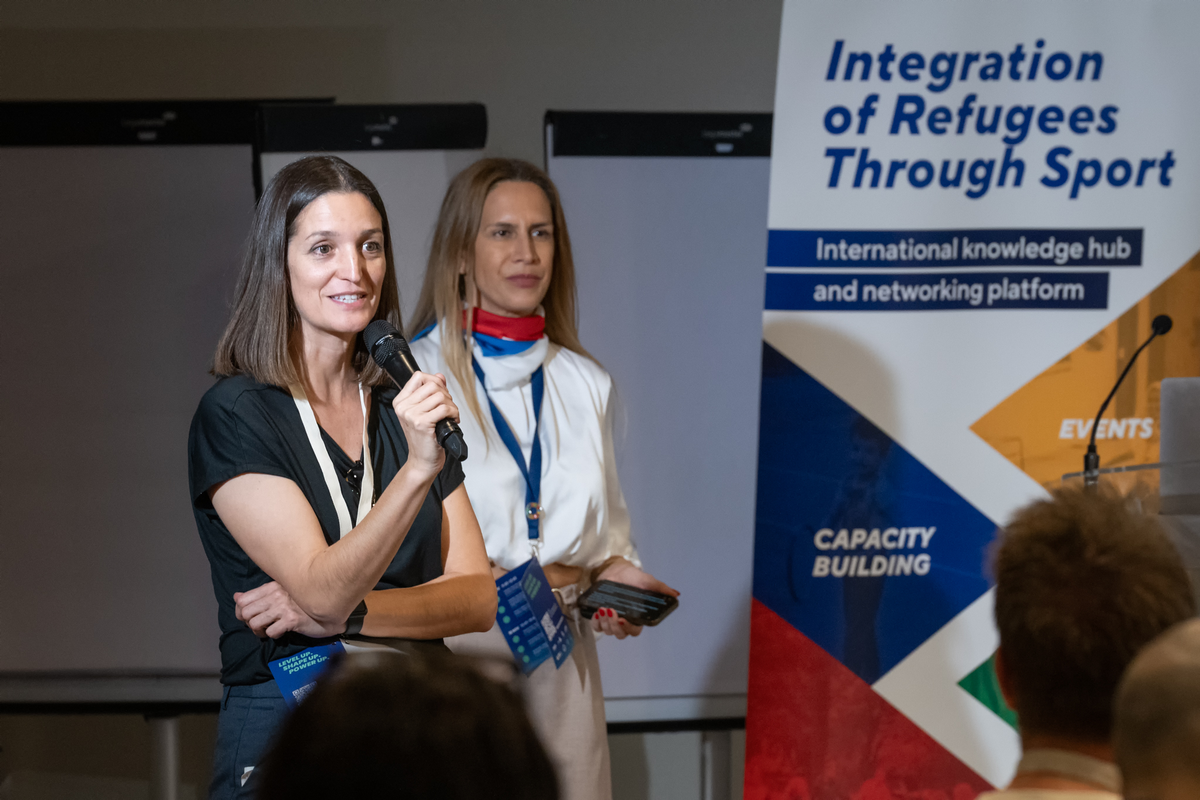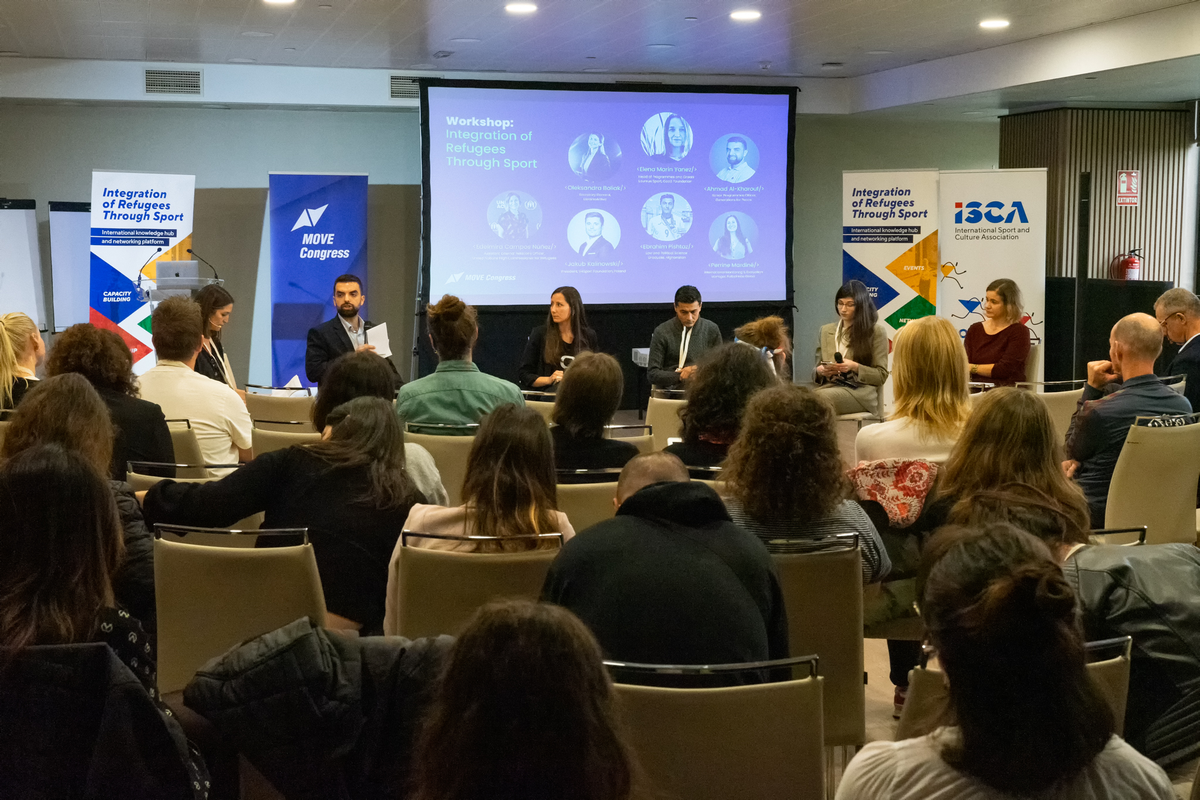
Discovering the lingua franca of integration of refugees through sport
In a constantly changing world, an estimated 114 million displaced people (including almost 40 million refugees) are escaping conflicts, violation of human rights, persecution or natural disasters. Despite the different circumstances in the affected countries and continents hosting these people, one thing remains the same: sport represents a unique power to support these people to adapt and integrate in their new cultures and societies. Hence, on 16 November at the MOVE Congress, participants interested in the topic of integration of refugees through sport were invited to an interactive workshop packed with expert presentations, a panel discussion and active learning.
During the two-hour session, the speakers presented both the different and similar challenges that displaced people face in European countries, as well as in Africa, Middle East and in the Americas. Most refugees (70% in 2022) maintain close ties to their motherland, and many also struggle to integrate into their new communities due to racism, miscommunication, intolerance and even violence against refugees. This only adds more pressure to the already extreme circumstances and their abilities to cope. However, it is possible to (re)build bridges: sport can play a key role if used as a universal language and used to create safe spaces, the speakers argued.
At the beginning of the session, Jakub Kalinowski, president of V4Sport Foundation, Poland, presented a two-year project (Integration of Ukrainian Refugees Through Sport) that was developed as an instant reaction to the Russian-Ukrainian war. As a result of the war, millions of Ukrainian refugees fled the country entering mainly Poland and Romania, which posed several challenges to the hosting countries, including the need to help refugee children integrate.
To keep up with the increasing need to provide Ukrainian refugees with a safe space, V4Sport (with the support of the International Sport and Culture Association (ISCA)) submitted a proposal to finance the development of educational, fun and age-appropriate materials for children and training for schools and sport organisations, as well as engaging a wider network of sport organisations in a coordinated approach to supporting the Ukrainian children with their trauma and psycho-social stress. The language barrier has been a great challenge even from the very start of the war, but as Kalinowski noted, the “teachers don’t speak Ukrainian, they don’t speak Russian as many of the Ukrainian kids do, but we do believe that being active, doing things together, is the best language that brings kids together, and by having fun, they create those very important bonds that help them to navigate through this very difficult period”.
 Creating the future together
Creating the future togetherBuilding on the slogan of the 2012 Ukrainian-Polish co-hosted European Football Championship (“Creating history together”), the Integration of Ukrainian Refugees Through Sport project envisaged the slogan Creating a Future Together.
Following this introductory presentation, which set the landscape and scope for the panel discussion and workshop, representatives of Fútbol Más invited attendees to a short activation session where participants had the chance to experience in practice how movement/physical activity and sport can be used as a universal language.
After the audience’s happy brain chemicals were activated by the quick game, the panel discussion began and was moderated by Elena Marin Yanez, Head of Programmes and Grants at Laureus Sport for Good Foundation, who invited the panellists to share, discuss and reflect on their work and experiences.
Ebrahim Pishtaz had been studying Law and Political Science for two years and had been working with the World Food Programme, UN Assistance Mission in Afghanistan, WFP World Vision and collaborated with the Government of Afghanistan before he arrived in Spain in 2022 as a refugee. He gave the audience an insight on how a young man – as he is only 27 years of age – had planned his life working with international agencies to help his country and his people live under better (and safer) circumstances. But unfortunately, due to the war, he had to leave Afghanistan, leaving – as he referred to it – his simple life, with frequent hikes, playing and watching football, and all his plans for his future behind. When he arrived in Spain, he did not speak the language, he did not know anybody. But one day his roommate asked him if he wanted to go and play football. That was the light in the deep dark night.
“When I came here, I saw a lot of different faces, different colours. But still, we were the same. We can understand each other by looking in each other’s eyes. We didn’t need to talk,” Pishtaz said, reflecting on his memories of going to play football with fellow refugees.
Luckily, with the support of the Spanish UNHCR Committee, ACNUR, Red Deportivo and later the Football Federation of Spain, he could live his passion for football so far away from home that in a way strengthened his intrinsic motivation to learn Spanish and to make friends. Despite all the challenges he had faced, he is happy for his new life now.
Feeling safe is about physical and emotional safety
Following Ebrahim’s words, Edelmira Campos Núñez, Assistant External Relations Officer at the United Nations High Commissioner for Refugees, gave us an insight on how the UNHCR operates, not only in Spain, but also spreading the scope to the whole world. She highlighted two especially important toolkits developed by the UNHCR:
- More than a game toolkit developed within the framework of the UNHCR Sport Strategy 2022 – 2026
- Sport for protection toolkit
The strategy and the toolkits bring sport to some of the world’s most disadvantaged young people, regardless of the geographical location, with the goal to harness the power of sport to offer protection in terms of psychosocial well-being, social cohesion and social inclusion, both intra and interpersonal development, and environments for vulnerable children and youth.
Edelmira explained that humanitarian staff not only help and support refugees, but also observe them to see if they – especially women and girls – are being excluded from the community or treated as second-class citizens, even within the refugee camp. Therefore, the UNHCR places great emphasis on tailoring programmes for women and girls to help them feel empowered, to develop their leadership skills, provide safe spaces for education, with special regard to sexual education, and to prevent sexual violence.
“Feeling safe is not only about physical safety, but also emotional,” Edelmira Campos Núñez affirms.
Besides the international collaboration between national and international initiatives (e.g. promoting the Euro Unity Cup, Refugee Olympic Team, supporting the Women’s Race in Spain with free participation of women and girls in the race), UNHCR organises the Global Refugee Forum every four years, which will take place in Geneva 13-15 December 2023. On this occasion, UNHCR aims to mobilise pledges to protect refugees: in 2023 it is Sport for Inclusion and Protection which promotes activities and policies enabling protection, inclusion and self-reliance of refugees through sport, initiation of inclusive and safe sport-based programmes; targeted communication, evidence and advocacy; and strengthening partnerships and coordination.
Brightening up a “grey everyday” for children and adults in refugee camps
Building on programmes that empower refugees, Ahmad Al-Kharouf, Senior Programme Officer at Generations for Peace, Jordan, shared the essence of the Nashatati Programme through the eyes of Hamzeh Ali Aroush, a 14-year old Syrian refugee in Jordan attending the programme. It was launched in 2017 with the aim to provide children from grades 1 to 10 additional opportunities to interact and engage through fun after-school activities that foster life skills development, active lifestyle, tolerance, acceptance and social cohesion within communities in a safe environment.
Oleksandra Boliak, Secretary General of UkraineActive, explained how life has changed since the Russian – Ukrainian war broke out on 24 February 2022. UkraineActive is raising awareness of the health benefits of regular physical activity, as well as the costs and consequences of inactivity. Creating links and fostering partnerships between the physical activity sector, academia, government and civil society to identify common challenges and opportunities was not an easy task in the pre-war Ukraine, but the war brought along a blessing in disguise, as she mentioned: “since the beginning of the war everything has changed. At this moment, we have a strong partnership in the country among the sectors”.
The last panellist to speak up was Perrine Mardiné, International Monitoring and Evaluation Manager at Futbol Más Global (FM), an international organisation that uses sport to transform realities. Following on from the activation session, she highlighted that FM always puts the children in the centre to promote their well-being, using sport to do so. FM’s methodology mixes two elements: sport (tactical, technical content) and social/emotional content (e.g. conflict resolution). By mixing and integrating these two ingredients FM creates social-sport programmes for children and youth.
Perrine highlighted one example of an intervention in particular: The Kakuma Refugee Camp in Kenya, established in 1992 as a temporary facility, is by today one of the largest refugee camps in the world. Refugees from South Sudan, Ethiopia, Uganda, and Somalia escaping inhuman circumstances in their homelands try to find asylum here, and even though the basic needs i.e. meals, shelter, schools, medical centres are provided in the camp, “many people have been there for more than 10 years waiting for something to happen, something that is very unlikely to happen, and something that doesn’t depend on them,” Mardiné said.
Perrine Mardiné also mentioned a study that was carried out in Kakuma a few years ago that investigated the feelings of the refugees. In spite the predicted feelings such as: anger, fear, stress, anxiety, the majority of the respondents said: hopelessness. Not long after the study, Futbol Más arrived at the camp: bringing with them some colour to the brighten up the grey everyday of the refugees. And, all of the sudden, the reality changed, especially by mixing emotional and social content into a context in which “nothing happens”. They saw the results of the programme almost immediately in children feeling safer increasing their capacities to deal with these circumstances.
“Sport is social magnet that helps pass the differences. There is no judgement; everyone can participate,” Mardiné concluded, emphasising that sport is a vehicle to drive social cohesion and creating safe spaces for people who need it the most.
The panel closed with a final thought from Ebrahim Pishtaz: “We all have problems, we are far away from home and from family. We have financial difficulties. Every refugee has the same problems. But when we go on the field to play or train, we forget everything. We just try to enjoy the moment. And in that moment, we are the luckiest and happiest people in the world. (…) When I arrived here and saw girls playing with boys in the camps it was surprising, and it was new for me because I had never had this experience in my life. On the field we are in a safe place without threats or obligations. It feels like when you take a fish from the aquarium and put it in the ocean.”
At the end of the session, ISCA Project Coordinator Katerina Salta announced the debut of the project called IRTS Global, starting in January 2024. The partnership behind the project is unprecedented, comprising UN institutions, funding bodies, global networks, humanitarian organisations, and sporting bodies. And it is taking the international dimension of the Erasmus+ sport programme to a new level, with a truly global group of partners from both Erasmus+ countries and beyond.
Discover more about ISCA’s Integration of Refugees Through Sport initiatives at the dedicated website https://irts.isca.org/
By Anita Király, ISCA


